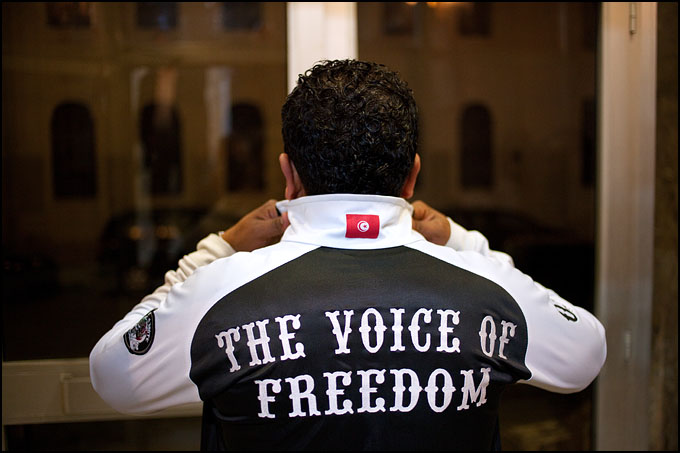National dialogue and constitutional process in Tunisia: ‘dangerous liaison’?

Why has a country with such homogeneity, a long constitutional tradition and the first written Constitution (the fundamental pact of 1861) in the Arab world still not been able to produce a Constitution three years after the end of authoritarianism? For many Tunisians observing the country’s convoluted democratic transition, this remains a very perplexing question.
While many factors have been advanced to explain the complex turns this process
has taken, one key reason is that the constitution drafting process has become
a tool for political blackmail between the different protagonists. This complex
dynamic is best explained by looking at the relationship between the
constitution making process and the ongoing national dialogue process.
To begin with, it must be recalled that members of Tunisia’s CA have so far
been unable to agree on some contentious issues around the proposed
constitution, such as the division of powers between the President of the
Republic and the Head of Government. As a result a commission, comprising
representatives of all parliamentary groups, was created to explore ways of
reaching a compromise on these issues, shortly after the publication of the
third draft.
While a compromise solution was reached on the issue of rights and freedoms and in particular article 48 of the draft, which regulates the "limits to limits", to the rights and freedoms provided in the draft, this positive trend took a downward turn following the assassination of CA member Mohamed Brahmi in late July and the consequent suspension of the CA, with many opposition CA members demanding a new head of government.
The response to this was a call for national dialogue, bringing together all political parties, by four Tunisian organizations; the General Union of Tunisian Workers (UGTT), Tunisian Union of Industry, Commerce and Handicrafts (UTICA), the Tunisian League for the Defence of Human Rights (LTDH) and the National lawyers Forum (INA). Having as its main goal the resolution of the crisis plaguing the country by ensuring agreement on a new head of government to complete the transition and establishing a high elections authority to prepare new elections, the national dialogue also had to resolve the blockage within the CA and ensure the expedited adoption of a new Constitution. Seeing that the national dialogue was essentially an attempt to resolve what had become more a political crisis, how is or was it related to the constitutional process?
For opposition parties, the three components of national dialogue (governmental,
electoral and constitutional) were interdependent processes. In particular with
regards to the constitutional process, whose success was seen to be completely
dependent on the outcome of the political component of the national dialogue,
notably the agreement on the choice for the future head of government—a
development which many believed would create a better atmosphere for reaching
compromise on the draft Constitution in the CA. Politicians’ inability to reach
a political solution on this question therefore effectively meant that the
constitutional process could not move forward. One reason for this is that
while the majority party in the CA—led by Ennahdha—technically had the numbers
to adopt the different articles of the draft, they lack the 2/3 majority
necessary to adopt the global document absent support from the opposition. This
makes the need for compromise even more pressing.
While some progress—by the admission of all parties—has been made since the commencement of the national dialogue, with compromise being reached, especially on the thorny issue of the powers of the president and the head of government, as well as on the judiciary and constitutional bodies, progress has been rocky. In fact, not only is there existing disagreement on the transitional provisions, but also the decision by the parliamentary majority to reduce the powers of the President of the CA (held by Etatkattol) by amending articles 36 and 79 of the rules of procedure provoked further tensions resulting in a brief suspension of the CA which lasted until the move was repealed.
Secondly, not all political parties returned to the negotiation table. In fact only the representatives of two political parties—the Democratic Alliance (DA) and the Afek who saw the joinder of the political process relating to the choice for head of government and the constitutional process as untenable— regained their seats on the Commission in charge of compromises. The rest of the opposition remained hesitant, arguing, as indicated earlier that the two processes are interlinked and separating them would only deprive them of a pressure tool to force the majority party’s hand on the need to agree on a new the head of government.
Today, even with the return of all members, obstacles still stand in the way of
the Commission’s work. While it is hard to clearly assign blame for these repeated
blockages, the undisputable reality seems to be that linking the
governmental/political process to the constitutional process has been more
detrimental to the latter. This is indeed so when one considers
that what is creating the most tension between the political class was more the
issue of selecting the head of government, rather than issues related to the
draft Constitution.
Nonetheless, what has been happening in Tunisia continues to be telling of the challenges and divisions still plaguing its political class as well as the climate of suspicion and mistrust that has poisoned relations and spilled over to the constitutional process. Despite talks on the need for impartiality and transparency in the process of selecting the head of government, parties still remain inclined to back only candidates that espouse their views. Under these conditions, the actors involved must first overcome the pervasive culture of mistrust before any progress on the constitutional front can be made.
[1] Researcher in international and constitutional law; Lecture at the Faculty of legal political and social sciences of the University of Tunis